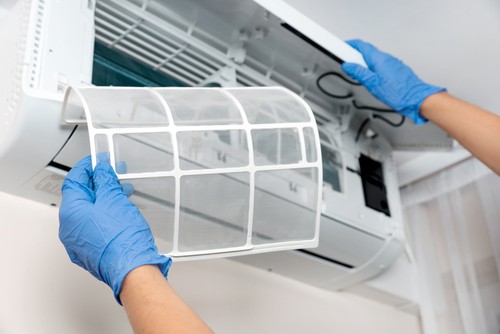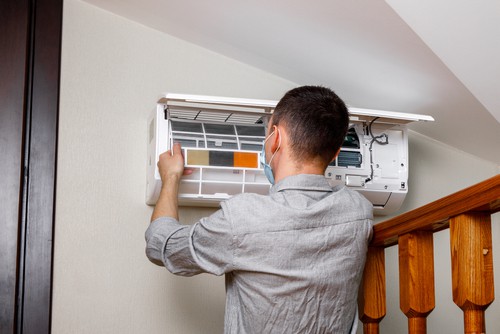Steps to Follow When Your Air Conditioner Stops Working

Steps to Follow When Your Air Conditioner Stops Working
Steps to Follow When Your Air Conditioner Stops Working – In a tropical climate like Singapore, air conditioning isn’t a luxury; it’s a necessity.
It relieves the unrelenting heat and humidity, making homes and workplaces more comfortable.
Has the air conditioner stopped working? Don’t sweat it. This article will guide you through the essential steps to diagnose, troubleshoot, and even prevent common air conditioner problems.
Diagnosing the Problem
Common Signs That Your Air Conditioner Is Not Working Properly
Several signs can indicate a problem with your air conditioner, from insufficient cooling to unusual noises or odors. It’s important to recognize these early to prevent minor issues from turning into major problems.
Initial Inspection: Indoor and Outdoor Units
Start by visually inspecting your indoor and outdoor units. Look for any signs of damage, leaks, blockages, or ice formation, which could suggest a problem.
Reviewing the Circuit Breaker
Check your circuit breaker if your air conditioner isn’t turning on. A tripped breaker could be the reason, but this could indicate a more serious electrical problem if it trips frequently.
Evaluating the Air Filters
Dirty or clogged air filters can restrict airflow and affect your air conditioner’s performance. Regularly cleaning or replacing your filters can help prevent this.
Basic Troubleshooting

Resetting Your Air Conditioner
Sometimes, simply resetting your air conditioner can solve the problem. Turn it off, wait for a few minutes, then turn it back on again to see if it starts working.
Cleaning and Replacing Air Filters
Air filters can greatly improve your air conditioner’s performance. It can also improve your indoor air quality by removing dust, allergens, and other particles.
Unclogging the AC Condensate Drain Line
A clogged condensate drain line can cause water leaks and other issues. Regularly cleaning this line can help prevent clogs.
Checking and Adjusting Thermostat Settings
If your air conditioner isn’t cooling properly, check your thermostat settings. A minor adjustment could solve the problem.
More Advanced Steps

- Checking the Refrigerant Levels
Low refrigerant levels can affect your air conditioner’s cooling efficiency. However, adding refrigerant is a job best left to professionals due to its environmental impact and the complexity of the task.
- Inspecting the Fan and Condenser Coils
Dirty or damaged fan blades or condenser coils can affect your air conditioner’s ability to dissipate heat. Regularly cleaning and inspecting these parts can help ensure optimal performance.
- Examining the Capacitor and Compressor
The capacitor and compressor are crucial components of your air conditioner. Faulty parts can affect cooling and require professional attention.
When to Call a Professional

While some air conditioner problems can be fixed with basic troubleshooting, others require professional expertise.
Recognizing when to call a professional can save you time, money, and potential damage to your air conditioner.
Choosing a qualified and reliable HVAC professional is crucial for proper air conditioner repair.
Look for professionals with good reviews, relevant qualifications, and experience in handling your specific air conditioner model or problem.
Preventive Measures to Avoid Future AC Problems
Regular AC Maintenance
Regular maintenance can prevent most air conditioner problems. This includes professional maintenance services and basic tasks you can do yourself, like cleaning or replacing filters and inspecting for visible issues.
Optimal Thermostat Settings
Proper thermostat settings can improve your air conditioner’s efficiency and prevent unnecessary strain on the system. Avoid setting your thermostat too low, as this can lead to higher energy bills and potential system breakdowns.
The Role of Insulation and Ventilation
Proper insulation and ventilation can help your air conditioner work more efficiently by reducing heat gain and maintaining good air circulation in your home.
Considerations for AC Replacement

Evaluating When to Repair vs. Replace
When faced with a significant air conditioner problem, you might need to decide whether to repair or replace the unit. Factors to consider include the age of your air conditioner, the cost of repair, and the potential benefits of a new, more efficient unit.
Types of Air Conditioners and Their Benefits
If you decide to replace your air conditioner, you have several options to consider. Different air conditioners have different benefits; the best choice depends on your specific needs and circumstances.
Cost and Energy Efficiency Considerations
While a new air conditioner requires a significant initial investment, it can also lead to substantial energy savings over time, especially if your old unit was inefficient.
Frequently Asked Questions (FAQs)
How Often Should I Service My AC?
Most experts recommend servicing your air conditioner at least once a year to keep it in good shape and prevent problems.
What is the Lifespan of an Average Air Conditioner?
The lifespan of an air conditioner can vary widely depending on the model, usage, and maintenance, but on average, you can expect it to last around 15-20 years.
Can I Troubleshoot Major AC Problems on My Own?
While you can troubleshoot some minor problems, major issues typically require professional intervention due to the complexity and potential risks involved.
How Can I Improve the Energy Efficiency of My AC?
Improving your air conditioner’s energy efficiency can be as simple as cleaning or replacing your filters, maintaining optimal thermostat settings, and ensuring good insulation and ventilation in your home.
Steps to Follow When Your Air Conditioner Stops Working – Conclusion

Knowing what to do when your air conditioner stops working can save you a lot of stress.
From initial inspection and basic troubleshooting to recognizing when to call a professional, each step is crucial to getting your air conditioner back up and running.
Preventive measures, like regular maintenance and optimal thermostat settings, can prevent most air conditioner problems and help your unit run efficiently.
Are you seeking professional and reliable aircon repair or maintenance services in Singapore? Contact us today!




